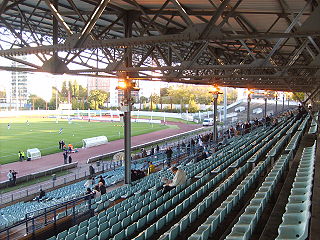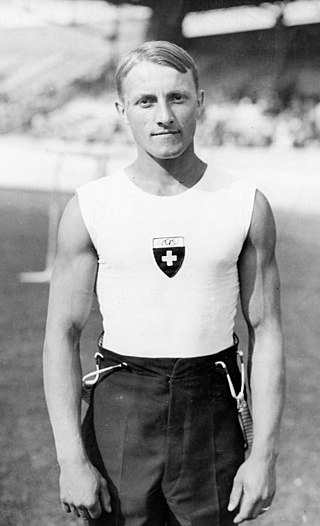At the 2004 Summer Olympics in Athens, Greece, three disciplines of gymnastics were contested: artistic gymnastics, rhythmic gymnastics and trampoline. The artistic gymnastics and trampoline events were held at the Olympic Indoor Hall and the rhythmic gymnastics events were held at the Galatsi Olympic Hall.
At the 1976 Summer Olympics, fourteen different artistic gymnastics events were contested, eight for men and six for women. All events were held at the Montreal Forum in Montreal from July 18 through 23.

The men's individual all-around, also known as the heptathlon, was one of two gymnastics events on the Gymnastics at the 1908 Summer Olympics programme. As suggested by the alternate name, the competition included seven events with the scores summed to give a final score. Each nation could enter up to 20 gymnasts, with France and Great Britain each entering the maximum. A total of 97 gymnasts from 12 nations competed. The event was won by Alberto Braglia of Italy, the nation's first medal in the men's individual all-around. Silver went to Walter Tysall of Great Britain, the first medal for the nation as well. France's Louis Ségura earned bronze.
The men's triathlon was an unusual event conducted during the 1904 Summer Olympics. The International Olympic Committee lists it as part of the Athletics at the 1904 Summer Olympics programme, though other sources list it among the Gymnastics at the 1904 Summer Olympics events. Gymnasts rather than track and field athletes competed. However, the three events of the triathlon were decidedly athletic rather than gymnastic in nature, comprising the long jump, the shot put, and the 100 yard dash.

The men's parallel bars was an artistic gymnastics event held as part of the gymnastics programme at the 1904 Summer Olympics. It was the second time the event was held at the Olympics. An unknown number of gymnasts competed, only five are known. The competition was held on Friday, October 28, 1904. The event was won by George Eyser, with Anton Heida second and John Duha.

The men's horizontal bar was an artistic gymnastics event held as part of the gymnastics programme at the 1904 Summer Olympics. It was the second time the event was held at the Olympics. An unknown number of gymnasts competed, only five are known at present. The competition was held on Friday, October 28, 1904. Anton Heida and Edward Hennig tied for first, with George Eyser third.

The men's vault was an artistic gymnastics event held as part of the gymnastics programme at the 1904 Summer Olympics. It was only the second time that the event was held at the Olympics. An unknown number of gymnasts competed, only five are known. The competition was held on Friday, October 28, 1904.

The men's pommel horse was an artistic gymnastics event held as part of the gymnastics programme at the 1904 Summer Olympics. It was the second time the event was held at the Olympics. An unknown number of gymnasts competed, only five are known. The competition was held on Friday, October 28, 1904. All known competitors were American. The event was won by Anton Heida, with George Eyser second and William Merz third.
The men's combined was an artistic gymnastics event held as part of the gymnastics programme at the 1904 Summer Olympics, and was held on Friday, October 28. 1904 was the second time a combined apparatus event was held at the Olympics, though the previous incarnation was more similar to the all-around turnverein which took place in July. The format of the combined, however, was the basis for later all-around type events.

The men's rings was an artistic gymnastics event held as part of the gymnastics programme at the 1904 Summer Olympics. It was the second time the event was held at the Olympics. An unknown number of gymnasts competed, only three are known. The competition was held on Friday, October 28, 1904. All three of the known competitors, the medalists, were American. The event was won by Herman Glass, with William Merz second and Emil Voigt third.

The men's rope climbing was an artistic gymnastics event held as part of the gymnastics programme at the 1904 Summer Olympics. It was the second time the event was held at the Olympics. An unknown number of gymnasts competed; only three are known, all American. The competition was held on Friday, October 28, 1904. George Eyser won the event, with Charles Krause second and Emil Voigt third.
The men's club swinging was an artistic gymnastics event held as part of the gymnastics programme at the 1904 Summer Olympics. It was the only time the club swinging event was held, though an "Indian clubs" competition was held at the 1932 Summer Olympics. An unknown number of gymnasts competed, only three are known. The competition was held on Friday, October 28, 1904.
The men's triathlon was an artistic gymnastics event held as part of the gymnastics programme at the 1904 Summer Olympics. It was the only time the event was held at the Olympics. The competition was held on Friday, July 1, 1904, and on Saturday, July 2, 1904. One hundred and nineteen gymnasts from three nations competed.

The men's artistic individual all-around was an artistic gymnastics event held as part of the gymnastics programme at the 1904 Summer Olympics. It was the second time an all-around event was held at the Olympics. The competition was held on Friday, July 1, 1904 and on Saturday, July 2, 1904. One hundred and nineteen gymnasts from three nations competed. The event was won by Julius Lenhart, an Austrian gymnast living in the United States and competing under the auspices of his Philadelphia-based club. Silver went to Wilhelm Weber of Germany, with bronze to Adolf Spinnler of Switzerland. They were the first medals in the event for each of those nations, as France had swept the medals in 1900.

The men's parallel bars event was part of the gymnastics programme at the 1924 Summer Olympics. It was one of nine gymnastics events and it was contested for the third time after 1896 and 1904. The competition was held on Sunday, July 20, 1924. Seventy-two gymnasts from nine nations competed. The event was won by August Güttinger of Switzerland, the nation's first victory in the event. Robert Pražák of Czechoslovakia and Giorgio Zampori of Italy earned silver and bronze, respectively.

The men's rings event was part of the gymnastics programme at the 1924 Summer Olympics. It was one of nine gymnastics events and it was contested for the third time after 1896 and 1904. The competition was held on Saturday, July 19, 1924. Seventy gymnasts from nine nations competed, with each nation having an 8-gymnast team. The event was won by Francesco Martino of Italy, the nation's first medal in the event. Robert Pražák and Ladislav Vácha of Czechoslovakia earned silver and bronze, respectively.
The men's vault event was part of the gymnastics programme at the 1924 Summer Olympics. It was one of nine gymnastics events and it was contested for the third time after 1896 and 1904. The competition was held on Monday, July 21, 1924. Seventy gymnasts from nine nations competed. The eight members of each nation's gymnastics team all competed; Czechoslovakia only had six competitors start the vault. The event was won by Frank Kriz of the United States, the nation's second consecutive victory in the event. Jan Koutný and Bohumil Mořkovský of Czechoslovakia took silver and bronze, respectively, the nation's first medals in the event.

The men's artistic individual all-around event was part of the gymnastics programme at the 1924 Summer Olympics. It was one of nine gymnastics events and it was contested for the sixth time. The competition was held from Thursday, 17 July 1924, to Wednesday, 23 July 1924. Seventy-two gymnasts from nine nations competed. Each nation could send up to 8 gymnasts, up from 6 in previous Games. For the first time since 1904, the scores for individual competitors were used to calculate a team score. The men's artistic individual all-around was won by Leon Štukelj of Yugoslavia. Czechoslovakia's Robert Pražák took silver, while Bedřich Šupčík earned bronze. Both nations were making their debut in the event.

The men's vault event was part of the gymnastics programme at the 1928 Summer Olympics held in Amsterdam. It was one of seven gymnastics events for men and it was contested for the fourth time after 1896, 1904, and 1924. Scores from the vault event were added to the results from other individual apparatus events to give aggregate scores for the individual and team all-around events. There were 85 competitors from 11 nations. Each nation had a team of 8 gymnasts; three of the 88 men did not start. The event was won by Eugen Mack of Switzerland, the nation's first victory in the event and first medal since 1896. Emanuel Löffler gave Czechoslovakia its second consecutive silver medal. Stane Derganc's bronze was Yugoslavia's first medal in the event.

The men's artistic individual all-around event was part of the gymnastics programme at the 1928 Summer Olympics. It was one of seven gymnastics events for men and was the seventh Olympic men's all-around gymnastic championship. Scores from the individual apparatus events were added to give aggregate scores for the individual all-around; individual all-around scores were similarly summed for the team all-around event. There were 88 competitors from 11 nations. Each nation sent a team of 8 gymnasts. The event was won by Georges Miez of Switzerland, with his countryman Hermann Hänggi taking silver. They were the first medals in the event for Swiss gymnasts since 1904 and the first gold medal ever for a Swiss man in the individual all-around. Defending Olympic champion Leon Štukelj of Yugoslavia finished with the bronze this time, making him the third man to win multiple medals in the event.








